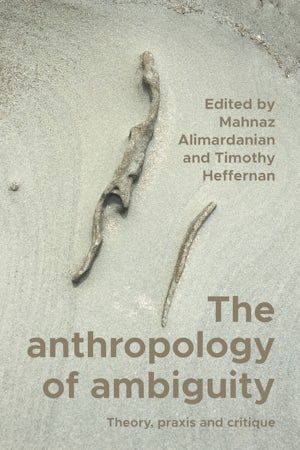

- Price: $140.00
- Pages: 264
- Carton Quantity: 20
- Publisher: Manchester University Press
- Imprint: Manchester University Press
- Publication Date: 28th May 2024
- Illustration Note: 7 b&w illustrations
- ISBN: 9781526173843
- Format: Hardcover
- BISACs:
SOCIAL SCIENCE / Anthropology / Cultural & Social
SOCIAL SCIENCE / Sociology / General
PHILOSOPHY / Movements / Existentialism
“In unsettling times such as these, The Anthropology of ambiguity provides a critical resource for thinking through the ambient flux of ambiguous experiences that increasingly constitute our contemporary condition. Ambitious theoretically and attuned to the intricacies of lived experience, the volume significantly contributes to anthropological efforts to understand our complexly situated worldly existence as humans.”
C. Jason Throop, Professor & Chair, Department of Anthropology, University of California, Los Angeles
"Narrated through captivating ethnography and thought-provoking analyses, this volume brilliantly showcases nuanced ways in which reading ambiguity can help us understand the crises of our times."
Yasmine Musharbash, Associate Professor, Australian National University
'Grounded in ethnographic rigor, the contributors collectively emphasize the productive potential of ambiguity, challenging its conventional framing as a mere obstacle to clarity. Instead, ambiguity is celebrated as a dynamic force that underpins knowledge production, societal negotiation, and meaning-making across cultural contexts.'
Intan Rosita et al., Reviews in Anthropology
Introduction - Timothy Heffernan and Mahnaz Alimardanian
Part I: Theorising ambiguity
1 Ontology and its double: on the nature of ambiguity and lived experience – Mahnaz Alimardanian
2 Ambiguity and catastrophe: crises of understanding in the age of COVID-19 – David J. Rosner
3 Ambiguity and politics: the suppression of complexity in Australian governmental responses to climate change – Jonathan P. Marshall
Part II: Navigating temporal disruption
4 Queering the crisis–recovery nexus: personhood and societal transformation after economic collapse in Iceland – Timothy Heffernan
5 Accommodating care through strategic ignorance: the ambiguities of kidney disease amongst Yol?u renal patients in Australia’s Northern Territory – Stefanie Puszka
6 Charting fields of uncertainty: disaster, displacement and resilience in Bangladeshi char villages – Mohammad Altaf Hossain
Part III: Imaging an ‘otherwise’
7 Ambiguity in Belgrade’s bike activism: marginalised activists, powerful agents of change - Sabrina Steindl-Kopf
8 Adding (ambiguous) value: interfacing between alternative economics and entrepreneurial innovation in Ecuador – Alexander Emile D'Aloia
9 The sovereign’s road: checkpoints and the ambiguity of exception during Aotearoa’s lockdown – Joe Clifford
10 Grease Yaka in Sri Lankan political culture: humour, anxiety and existential ambiguities in public sphere – Anton Piyarathne
Part IV: Self-realisation and disjuncture
11 Liminal ambiguity: the tricky position of being Black in white skin – Suzi Hutchings
12 The ambiguous path of self-cultivation in contemporary China – Gil Hizi
13 Ontological ambiguity: crisis, hyperfiction and social narratives in postmodern Japan – Angélica Cabrera Torrecilla
Afterword: sitting and being with ambiguity - Mahnaz Alimardanian and Timothy Heffernan
Index
- Price: $140.00
- Pages: 264
- Carton Quantity: 20
- Publisher: Manchester University Press
- Imprint: Manchester University Press
- Publication Date: 28th May 2024
- Illustrations Note: 7 b&w illustrations
- ISBN: 9781526173843
- Format: Hardcover
- BISACs:
SOCIAL SCIENCE / Anthropology / Cultural & Social
SOCIAL SCIENCE / Sociology / General
PHILOSOPHY / Movements / Existentialism
“In unsettling times such as these, The Anthropology of ambiguity provides a critical resource for thinking through the ambient flux of ambiguous experiences that increasingly constitute our contemporary condition. Ambitious theoretically and attuned to the intricacies of lived experience, the volume significantly contributes to anthropological efforts to understand our complexly situated worldly existence as humans.”
C. Jason Throop, Professor & Chair, Department of Anthropology, University of California, Los Angeles
"Narrated through captivating ethnography and thought-provoking analyses, this volume brilliantly showcases nuanced ways in which reading ambiguity can help us understand the crises of our times."
Yasmine Musharbash, Associate Professor, Australian National University
'Grounded in ethnographic rigor, the contributors collectively emphasize the productive potential of ambiguity, challenging its conventional framing as a mere obstacle to clarity. Instead, ambiguity is celebrated as a dynamic force that underpins knowledge production, societal negotiation, and meaning-making across cultural contexts.'
Intan Rosita et al., Reviews in Anthropology
Introduction - Timothy Heffernan and Mahnaz Alimardanian
Part I: Theorising ambiguity
1 Ontology and its double: on the nature of ambiguity and lived experience – Mahnaz Alimardanian
2 Ambiguity and catastrophe: crises of understanding in the age of COVID-19 – David J. Rosner
3 Ambiguity and politics: the suppression of complexity in Australian governmental responses to climate change – Jonathan P. Marshall
Part II: Navigating temporal disruption
4 Queering the crisis–recovery nexus: personhood and societal transformation after economic collapse in Iceland – Timothy Heffernan
5 Accommodating care through strategic ignorance: the ambiguities of kidney disease amongst Yol?u renal patients in Australia’s Northern Territory – Stefanie Puszka
6 Charting fields of uncertainty: disaster, displacement and resilience in Bangladeshi char villages – Mohammad Altaf Hossain
Part III: Imaging an ‘otherwise’
7 Ambiguity in Belgrade’s bike activism: marginalised activists, powerful agents of change - Sabrina Steindl-Kopf
8 Adding (ambiguous) value: interfacing between alternative economics and entrepreneurial innovation in Ecuador – Alexander Emile D'Aloia
9 The sovereign’s road: checkpoints and the ambiguity of exception during Aotearoa’s lockdown – Joe Clifford
10 Grease Yaka in Sri Lankan political culture: humour, anxiety and existential ambiguities in public sphere – Anton Piyarathne
Part IV: Self-realisation and disjuncture
11 Liminal ambiguity: the tricky position of being Black in white skin – Suzi Hutchings
12 The ambiguous path of self-cultivation in contemporary China – Gil Hizi
13 Ontological ambiguity: crisis, hyperfiction and social narratives in postmodern Japan – Angélica Cabrera Torrecilla
Afterword: sitting and being with ambiguity - Mahnaz Alimardanian and Timothy Heffernan
Index

